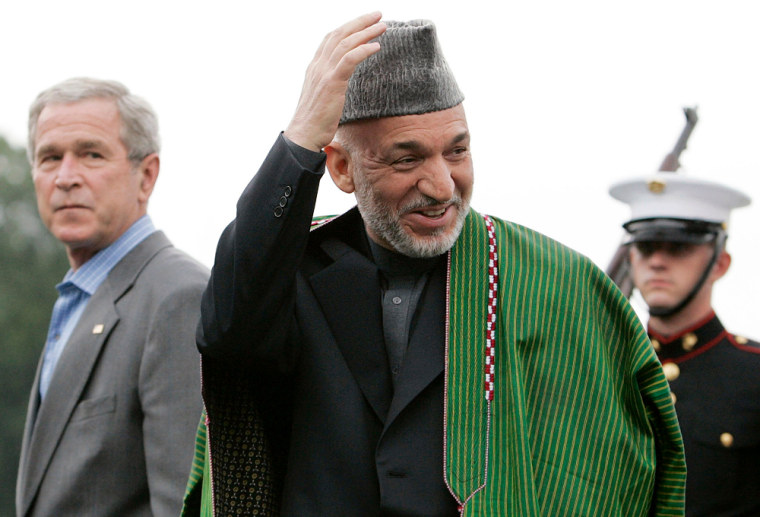President Bush said Monday he is confident that with the right intelligence U.S. and Pakistan governments can take out al-Qaida leaders, and he declined to rule out consulting first with Pakistan before ordering U.S. forces to act.
"With real actionable intelligence, we will get the job done," Bush said.
He was asked whether he would wait on permission from Pakistani President Gen. Pervez Musharraf before committing the U.S. military to move on "actionable intelligence" on the whereabouts of terrorist leaders in Pakistan. He did not answer directly.
Bush was at the presidential retreat at Camp David for two days of meetings with Afghan President Hamid Karzai. The two held talks on a rash of crises confronting Afghanistan: civilian killings, a booming drug trade and the brazen resurgence of the Taliban.
Karzai said that he and Musharraf, who are meeting this week in the Afghan capital of Kabul, would discuss how to tackle the problem of lawlessness and extremist hideouts along Pakistan's border area with his country.
'Progress is being made'
Bush and Karzai put a positive spin on Afghanistan's progress since the 2001 defeat of the repressive Taliban, but they stressed that serious problems remain.
"There is still work to be done, don't get me wrong," Bush said. "But progress is being made, Mr. President, and we're proud of you."
Karzai acknowledged that a resurgent Taliban is a problem in Afghanistan. But he said that it is not a threat to his government. Karzai is Afghanistan's first democratically elected president.
"We have a long journey ahead of us but what we have traveled so far has given us greater hope for a better future for a better life," Karzai said at a joint news conference here with Bush.
With the six-year anniversary of the Sept. 11, 2001, attacks approaching, Bush is eager to assure Karzai — and the American public — he is committed to shoring up Afghanistan and combating the Taliban and al-Qaida.
But Karzai brought little encouraging news about the hunt for bin Laden, telling CNN’s “Late Edition” the United States and its allies were no closer than they were a few years ago to tracking down the elusive mastermind of the Sept. 11 attacks.
“We are not closer, we are not further away from it. We are where we were a few years ago,” Karzai said.
Bin Laden is believed by U.S. intelligence officials to be hiding in the rugged tribal region of Pakistan, an area near the border of Afghanistan that has been a source of concern to Karzai because it is seen as a hotbed of Taliban activity.
Struggling leader
Despite his strong Western backing, Karzai has been the target of three assassination attempts and has struggled to build a robust central government amid longstanding tribal rifts and strong warlord control in the provinces.
The resurgence of the Taliban has led to the worst violence in Afghanistan since 2001, particularly over the last 18 months.
One issue Karzai wants to raise with Bush is his concern about a rise in deaths of civilians killed in airstrikes by U.S. and NATO-led forces aiming at the Taliban.
And Bush may want to broach U.S. concerns that Iran may be fueling violence by supplying weapons across the border.
However, Karzai on Sunday disagreed that Iran was a source of problems, describing it instead as “a helper” to Afghanistan and a supporter in its quest for peace.
Bush and Karzai also will discuss the crisis involving 21 Korean hostages seized by the Taliban in July. The kidnappers have killed two of the 23 initially captured and are demanding the release of Taliban prisoners in exchange.
South Korea has appealed to the United States and the Afghan officials to negotiate the release. Afghan officials are wary of making concessions for fear they might encourage more kidnappings.
“We are working very, very hard on this question,” Karzai told CNN. “We will not do anything that will encourage hostage-taking, that will encourage terrorism. But we will do everything else to have them released.”
White House National Security Council spokesman Gordon Johndroe said the United States urged the immediate release of the hostages and called the kidnapping an “an uncivilized and brutal act.”
